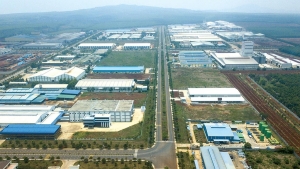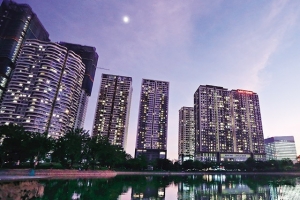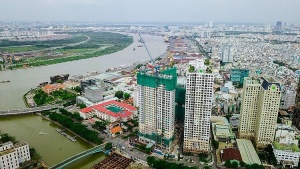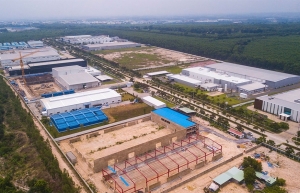A great chance to invest in commercial property
Recent lending restrictions, investor outflow from corporate bonds, and increasing interest rates have made the residential real estate market less liquid. However, the commercial real estate market is still seen as having substantial growth potential.
 |
| Vietnam's commercial property sector offers a great deal of promise since supply is restricted and demand is rising rapidly. Photo: L.T |
According to a recent analysis by Cushman & Wakefield Vietnam, Vietnam's commercial real estate sector is still fairly young and mostly centred on Ho Chi Minh City and Hanoi. Vietnam ranks 15th in the world in terms of population (with almost 100 million people), and its urbanisation rate exceeds 40 per cent. Along with this, every year, a large number of migrants – particularly young people – arrive in major cities.
Meanwhile, only roughly 820,000 square metres of Class A office space is available in Ho Chi Minh City and Hanoi combined. This is much less than regional office markets such as Tokyo (about 10 million sq.m), Seoul (4.3 million sq.m), and Singapore (2.6 million sq.m).
Trang Bui, general manager of Cushman & Wakefield Vietnam said, "We can certainly see the increase in commercial demand from the new generation as they reach the age where they want to rent. They are willing to spend more money on enhancing their own experiences, including shopping, travel, healthcare, education, and supplementary services.
"All human needs, from the most fundamental to the most complex, must be met by real estate. We anticipate that Vietnam's investment in commercial property might reach tens of billions of dollars in order to meet the demands of the metropolis."
A total of 68 per cent of poll respondents from the Batdongsan website who were questioned about their plan to purchase real estate within the next year stated they would. The larger a consumer's real estate holdings, the greater their desire to purchase additional homes and land. Some 46 per cent of those who do not own any properties want to purchase real estate in 2023, compared with 79 per cent of those with two properties and up to 87 per cent of those with three or more homes.
Currently, several investors are concerned with choosing the optimal timing to invest in commercial properties.
Tran Khanh Quang, general director of Viet An Hoa Real Estate Investment, said that when investors observe the market rising, they fear missing out on possibilities and are thus compelled to participate. When the market declines and investors realise the future is bleak, they seek to protect their assets and sell as quickly as possible, resulting in a market decline.
According to Quang, if investors want to reduce risk, they should follow the market movement more closely until the second quarter of 2023. However, according to this expert, investors should not be timid if they have access to capital.
"Once you've determined the thing you want to purchase, spend around two weeks observing. In addition to evaluating the price level in the region, focus on the product's discount. If you see a price adjustment of 3 to 7 per cent during this period, it is probable that the investor has a pressing need to sell the commodities immediately. Investors should choose items about which they have prior knowledge in order to bargain and acquire them at a reasonable price. Before making a judgement, investors should also investigate the legitimacy of the goods," Quang said.
According to Trang, now is the optimal moment since most commercial properties have a finite lifespan regardless of how well they are maintained. When an asset's useful life expires, its value drops and it becomes outdated.
For instance, an outdated office building may not have a high-speed Internet connection or modern smart gadgets, so tech businesses and many other tenants will not choose to establish offices in these antiquated buildings, even if their locations are ideal.
In addition, in contrast to new urban development projects in other nations, the absence of preferential policies is one of the greatest hurdles to the growth of commercial real estate in Vietnam. Investors want additional assistance with legal and tax difficulties.
"Creating a more favourable and transparent business climate would function as a catalyst to speed up the growth of commercial real estate in Vietnam," Trang added.
 | Unveiling bright spots in the property market Capital bottlenecks, liquidity losses, and regulatory limitations make 2023 property market predictions difficult. But there are a number of clear positives. |
 | Uplifting outlook for 2023 property market The property market has shown several favourable signs and is anticipated to become more robust in 2023. |
 | Property slowdown unlikely to become systemic crisis The current property crisis in Vietnam is not likely to be systemic because of the real estate sector’s moderate size and limited links to the banking sector, according to a recent report. |
 | Industrial property taking spotlight The industrial real estate segment wants to be a bright spot for the country in 2023, and the prospects are there for new funding from neighbouring countries if Vietnam can utilise its advantages to the fullest. |
What the stars mean:
★ Poor ★ ★ Promising ★★★ Good ★★★★ Very good ★★★★★ Exceptional
Related Contents
Latest News
More News
- Construction firms poised for growth on public investment and capital market support (February 11, 2026 | 11:38)
- Mitsubishi acquires Thuan An 1 residential development from PDR (February 09, 2026 | 08:00)
- Frasers Property and GELEX Infrastructure propose new joint venture (February 07, 2026 | 15:00)
- Sun Group led consortium selected as investor for new urban area (February 06, 2026 | 15:20)
- Vietnam breaks into Top 10 countries and regions for LEED outside the US (February 05, 2026 | 17:56)
- Fairmont opens first Vietnam property in Hanoi (February 04, 2026 | 16:09)
- Real estate investment trusts pivotal for long-term success (February 02, 2026 | 11:09)
- Dong Nai experiences shifting expectations and new industrial cycle (January 28, 2026 | 09:00)
- An Phat 5 Industrial Park targets ESG-driven investors in Hai Phong (January 26, 2026 | 08:30)
- Decree opens incentives for green urban development (January 24, 2026 | 11:18)

 Tag:
Tag:




















 Mobile Version
Mobile Version